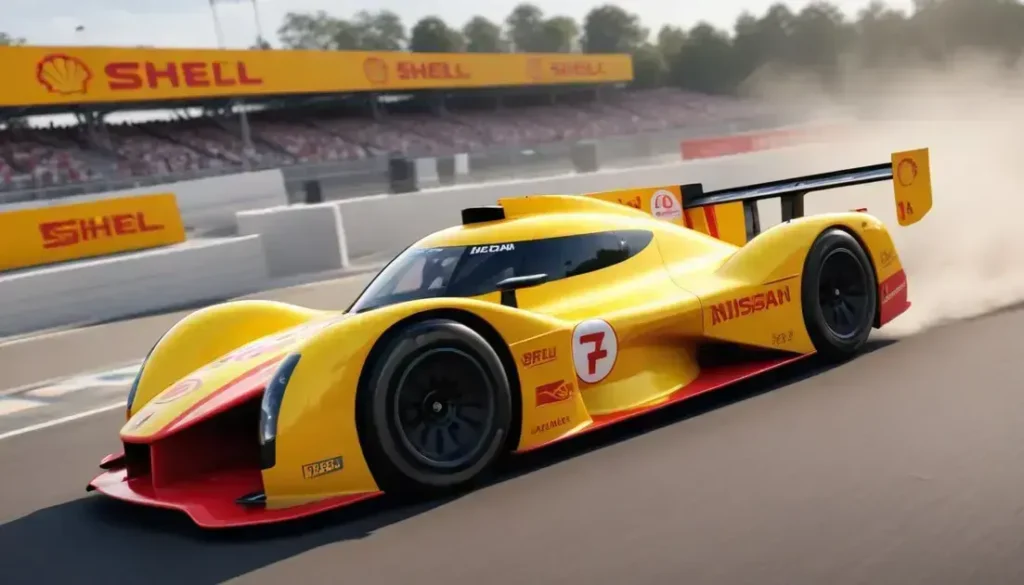EV racing presents significant opportunities for Australian businesses to lead in sustainable technologies, supply advanced components, and enhance their global competitiveness within the growing electric vehicle market.
In the evolving world of EV Racing, the partnership between Shell and Nissan paves the way for enhanced performance and sustainability. Are you ready to explore the opportunities?
Introduction to Shell and Nissan’s partnership
With the increasing focus on sustainability and innovation in the automotive sector, the partnership between Shell and Nissan represents a strategic move in the world of Formula E racing. This collaboration is driven by a shared commitment to enhancing electric vehicle (EV) performance, particularly through the development of high-performance lubricants designed specifically for the demands of racing.
The introduction of eFluids by Shell is a pivotal aspect of this partnership. These advanced lubricants are engineered to optimise the efficiency of electric vehicles, ensuring that they operate at peak performance during rigorous racing conditions. This not only enhances speed but also promotes sustainability by reducing energy consumption.
Moreover, this alliance marks a significant step towards the broader adoption of electric racing technology. As both companies leverage their expertise, the insights gained from Formula E will undoubtedly influence the larger automotive industry, paving the way for innovations that can benefit everyday consumers.
In this fast-paced environment, the collaboration between Shell and Nissan highlights the critical need for ongoing innovation in the EV sector, further establishing both brands as leaders in sustainable racing.
Significance of Formula E in the EV Racing landscape
The significance of Formula E in the EV racing landscape cannot be overstated. It serves as a pivotal platform for manufacturers and innovators to showcase their technological advancements in electric vehicles. As traditional motorsport evolves, Formula E is at the forefront, pushing the boundaries of what is possible in terms of sustainability and performance.
One of the primary roles of Formula E is to drive the adoption of electric mobility. By racing in major cities worldwide, it raises public awareness and interest in electric vehicles and their benefits. The exciting racing format captivates audiences, demonstrating that electric cars can deliver thrilling performance while aligning with environmental goals.
Furthermore, Formula E acts as a testing ground for new technologies that can eventually be transferred to commercial applications. This includes advancements in battery technology, energy recovery systems, and aerodynamics, all of which are crucial for the future of sustainable transport.
As a result, manufacturers involved in Formula E invest heavily in research and development. This competition not only enhances the performance of their racing cars but also translates to improvements in consumer electric vehicles, ultimately benefiting the broader market.
High-performance lubricants: What are eFluids?
eFluids are a revolutionary class of high-performance lubricants specifically designed for electric vehicles (EVs) and motorsport applications. These advanced fluids are formulated to enhance the efficiency and performance of electric drivetrains, aligning perfectly with the demands of modern racing.
Unlike traditional lubricants, eFluids optimise thermal management within the vehicle. This is crucial, as electric powertrains generate substantial heat during operation. With superior heat dissipation properties, eFluids ensure that components operate within optimal temperature ranges, thus preventing overheating and extending the lifespan of critical system parts.
Moreover, eFluids provide exceptional wear protection and reduce friction, allowing for smoother operation and improved energy efficiency. This means that not only do they enhance the overall performance of electric race vehicles, but they also promote sustainability by minimising energy loss.
Additionally, eFluids are designed to be environmentally friendly, contributing to the overarching sustainability goals of motorsport. Their composition facilitates less environmental impact while still providing the high performance that racing demands. As such, eFluids are poised to play a pivotal role in the future of both racing and everyday electric vehicles, promoting a shift towards greener technology.
Technical collaboration details between Shell and Nissan
The technical collaboration between Shell and Nissan is a groundbreaking partnership aimed at enhancing the performance and sustainability of electric vehicles. This partnership focuses on the development of advanced technologies that not only improve vehicle efficiency but also address industry challenges related to energy consumption and environmental impact.
One of the key aspects of this collaboration is the joint research into battery technology. By combining Nissan’s expertise in electric vehicle design with Shell’s capabilities in energy solutions, both companies are working to create batteries that offer greater range and quicker charging times. This innovation is crucial for the future of electric mobility.
Furthermore, Shell is supplying its cutting-edge eFluids, which are tailored for electric drivetrains. These high-performance lubricants ensure optimal operation under racing conditions, enhancing reliability and performance. Nissan, on the other hand, contributes its extensive experience in vehicle dynamics and control systems, ensuring smooth integration of these new technologies.
Additionally, the collaboration seeks to set standards for sustainability in motorsport by developing solutions that can be applied to both racing and consumer vehicles. This approach not only accelerates technological advancement but also promotes a more sustainable future for the entire automotive industry.
Impact on electric vehicle performance in racing
The impact of advancements in electric vehicle technology on racing performance is remarkable. As the motorsport world embraces electric vehicles, developments in battery systems and energy management are revolutionising the way races are won. Greater energy density in batteries allows for longer durations of high-performance driving, making electric race cars more competitive.
Recent innovations have led to significant changes in vehicle dynamics. Enhanced aerodynamics combined with lightweight materials contribute to improved speed and handling. These modifications enable electric vehicles to compete toe-to-toe with traditional combustion engines, often outpacing them in straight-line speed and cornering ability.
Moreover, the implementation of regenerative braking technology allows racers to recover energy during races. This not only extends race time but also adds a strategic layer to racing tactics, as drivers must manage their energy use throughout the event.
As electric vehicles continue to evolve, their performance in racing serves as a critical testing ground. Successes on the racetrack translate into better consumer models, accelerating the transition towards electric mobility on the roads. With every race, the performance benchmarks set by electric vehicles inspire manufacturers to push for more innovations, creating a cycle of technological advancement.
Decarbonization efforts in motorsport
Decarbonization efforts in motorsport are becoming increasingly essential as the industry grapples with its environmental impact. Leading organisations are recognising their responsibility to reduce carbon emissions while maintaining high-performance standards. This shift is driven by both regulatory pressures and consumer expectations for sustainability.
Many racing series, including Formula E, are at the forefront of these initiatives. They are promoting electric vehicles, which produce zero emissions during operation. This not only sets an example for the automotive industry but also helps to change public perception about electric mobility. As electric racing gains popularity, it showcases the exciting potential of sustainable technology.
Moreover, teams and sponsors are investing in carbon offset programs. These programmes aim to balance out emissions through activities such as reforestation and renewable energy projects. By participating, racing teams can contribute positively to the environment, linking sustainability directly to their brand identity.
Additionally, innovations in areas such as alternative fuels and energy-efficient logistics are being explored. These approaches support the use of cleaner energy sources without sacrificing performance. Overall, the push for decarbonization is reshaping the motorsport landscape, fostering a greener future while driving advancements in technology and engineering.
Nissan’s long-term commitment to Formula E
Nissan’s long-term commitment to Formula E underscores its dedication to sustainable motorsport and electric mobility. By actively participating in this innovative racing series, Nissan showcases its capabilities in developing cutting-edge electric vehicles while promoting the transition towards greener technology.
Since joining Formula E in 2018, Nissan has made significant strides in enhancing its electric race car technology. The brand utilises the data and insights gained from the races to accelerate the development of its commercial electric vehicle lineup. This synergy between racing and real-world applications helps Nissan to refine battery performance, energy efficiency, and overall vehicle dynamics.
Nissan’s investment in Formula E also aligns with its broader sustainability goals. The company aims to reduce its carbon footprint significantly while appealing to environmentally conscious consumers. By committing to a fully electric future, Nissan not only leads in technology innovation but also positions itself as a key player in the global shift towards sustainability.
Furthermore, the excitement and visibility of Formula E provide Nissan with a unique platform to engage fans and potential customers. This engagement helps to reshape perceptions of electric vehicles, proving that they can deliver thrilling performance while being environmentally friendly. Through its ongoing involvement in Formula E, Nissan is paving the way for a sustainable automotive future.
The role of eFluids in EV Racing success
The role of eFluids in the success of electric vehicle (EV) racing is pivotal. These high-performance lubricants are specifically designed to meet the unique demands of electric racing by optimising efficiency and enhancing vehicle performance. Unlike traditional lubricants, eFluids are engineered to function effectively under the extreme conditions present in motorsport, where every millisecond counts.
One of the key benefits of eFluids is their ability to manage thermal control, which is crucial for maintaining optimal operating temperatures. Electric powertrains generate significant heat during intense races, and eFluids help dissipate this heat effectively, preventing overheating and ensuring the longevity of critical components.
Moreover, eFluids reduce friction between moving parts, enhancing overall energy efficiency. This improved efficiency translates into better acceleration and performance on the track, giving teams a competitive edge. By minimising energy loss, eFluids allow drivers to maximise their speed and manage their battery usage more effectively during races.
Additionally, their environmentally friendly formulations align with the sustainability goals of EV racing, offering a greener alternative without compromising on performance. As electric racing evolves, eFluids will continue to play a crucial role in driving innovation and supporting the success of electric vehicles in high-pressure racing environments.
Sustainability in motorsport: Challenges and solutions
Sustainability in motorsport presents a complex array of challenges and solutions. As the industry faces increasing scrutiny regarding its environmental impact, racing organisations and teams are seeking ways to minimise their carbon footprints while maintaining high-performance standards.
One significant challenge is the reliance on fossil fuels, which has traditionally powered motorsport vehicles. Shifting towards alternative fuels and electric powertrains can address emissions concerns, but it requires substantial investment and infrastructure development. Additionally, the implementation of new technologies presents hurdles in terms of performance consistency and reliability.
Another challenge is the sustainability of event operations. Major racing events often generate considerable waste due to spectators, logistics, and teams. To combat this, many racing series are adopting measures such as digital ticketing, waste recycling programmes, and sourcing local produce for catering. These initiatives reduce waste and promote a circular economy within the sports industry.
Moreover, collaborations between motorsport organisations and environmental groups are becoming increasingly common. These partnerships foster innovation and allow for shared resources in developing sustainable technologies. By prioritising sustainability, motorsport can enhance its relevance in a world that values ecological responsibility while inspiring broader societal changes towards a greener future.
Future of EV Racing and Australian businesses
The future of EV racing presents exciting opportunities for Australian businesses. As the global shift towards electric mobility accelerates, Australian companies are positioned to benefit from advances in technology and sustainability practices within the racing industry. With Australia being a powerhouse in natural resources and innovation, local businesses can play a significant role in developing components and technologies for EVs.
One area ripe for growth is the production of high-performance batteries. Australian firms can focus on creating cutting-edge energy storage solutions that enhance the performance of electric race vehicles. This demand is supported by various government initiatives aimed at boosting Australia’s capabilities in clean technology.
Moreover, Australian companies involved in motorsport can leverage their expertise to improve energy efficiency and reduce waste during racing events. By adopting sustainable practices, these businesses not only align with global environmental goals but also attract environmentally conscious consumers seeking eco-friendly products.
As EV racing gains traction in both local and international markets, collaborations between racing teams, manufacturers, and technology providers will be vital. By fostering innovation and supporting the transition to electric mobility, Australia can establish itself as a leader in the EV racing sector, benefiting its economy while contributing to a sustainable future.
How will this impact Australian exporters?
The shift towards electric vehicles (EVs) and motorsport innovation significantly impacts Australian exporters. As global demand for sustainable transport solutions grows, local exporters stand to gain by supplying components and technologies that support this transition. Companies involved in manufacturing batteries, electric drivetrains, and other essential technologies can find new markets domestically and internationally.
Australian exporters can enhance their competitiveness by capitalising on the rise of EV racing. By investing in the research and development of advanced technologies, they can position themselves as leaders in the global EV supply chain. Offering high-quality components that meet the latest performance and sustainability standards will attract international partnerships.
Additionally, as the electric racing sector expands, opportunities arise for Australian businesses to export knowledge and expertise. Consulting services related to EV technology and sustainable practices can create new revenue streams. Educational institutions can also collaborate with exporters to foster skills development within the industry.
Furthermore, Australian exporters can leverage the visibility and excitement of EV racing events to promote their products. Engaging in strategic marketing efforts during these events will heighten brand awareness and open doors to new business prospects. Overall, the evolution of the EV sector presents promising opportunities for Australian exporters to thrive in a dynamic global market.
In conclusion, the future of EV racing and its impact on Australian businesses
The rise of electric vehicle racing presents exciting opportunities for Australian businesses to lead in innovation and sustainability. By embracing the shift towards electrification, local companies can enhance their position in the growing global market.
Australian exporters have the chance to play a significant role by supplying advanced technologies and components that support this transition. This not only helps boost the local economy but also contributes to a more sustainable future in motorsport and beyond.
As the industry evolves, it will be important for businesses to adapt, invest in new technologies, and seek partnerships that foster growth. Embracing sustainability is key, as it aligns with consumer expectations and regulatory standards.
By looking ahead and leveraging the opportunities presented by EV racing, Australian businesses can not only thrive but also lead the charge towards a greener and more innovative automotive future.
Frequently Asked Questions
How is EV racing impacting Australian businesses?
EV racing is opening up opportunities for Australian businesses to supply advanced technologies and components, thereby enhancing their competitiveness in the global market.
What role do Australian exporters play in the EV market?
Australian exporters can capitalise on the growing demand for electric vehicle components, such as batteries and drivetrains, contributing significantly to the local economy.
What are eFluids and why are they important in racing?
eFluids are high-performance lubricants designed for electric vehicles, optimizing thermal management and improving energy efficiency during races.
How can Australian businesses innovate within the EV sector?
By investing in research and development and collaborating with racing teams, Australian businesses can create cutting-edge technologies that support the EV transition.
What sustainability practices are being adopted in motorsport?
Motorsport is increasingly adopting sustainable practices, such as using alternative fuels, recycling waste, and promoting electric vehicles to minimize environmental impact.
How does EV racing help in changing perceptions about electric vehicles?
EV racing showcases the performance capabilities of electric vehicles, helping to shift public perception and demonstrating that they can offer high-speed racing experiences.


